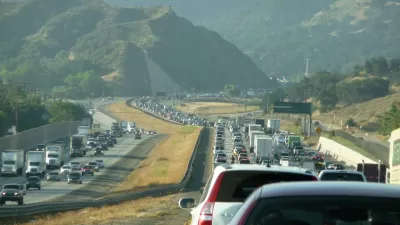As we inexorably approach the day the Highway Trust Fund goes broke, more policy experts offer creative alternatives to the per gallon gasoline tax. Michael Webber of the Energy Institute at UT Austin describes his option in a New York Times op-ed.

Webber, an associate professor of mechanical engineering and deputy director of the Energy Institute at the University of Texas at Austin, suggests that marrying the weight of the vehicle with the distance it travels makes more sense than attempting to increase the 18.4-cent gas tax, unchanged since 1993.
A better option is a “ton mile” fee based on how far vehicles travel and how heavy they are, so that all drivers pay their fair share to fix the resulting road damage. A one-ton car (which is typical for a compact car) that is driven 7,500 miles annually inflicts much less road damage than a two-ton truck that is driven 15,000 miles. While the gas tax captures some of that difference, as the truck driver would buy more fuel, it is not perfectly aligned.
As for the problems associated with vehicle-miles-traveled fees, he proposes a low-tech alternative:
(R)ather than using tracking devices, the fee could be assessed during an annual sticker renewal or inspection that is conducted at state level: All the inspector has to do is read the odometer, look up the gross vehicle weight of the car’s make and model, then assess the fee. With a fee on the order of two cents per ton mile, gas and diesel taxes could be eliminated entirely.
The advantages of the ton-mile-fee is that it encourages lighter vehicles (less wear on the roadway), reduced driving (fewer emissions) while ensuring that all vehicles, including the battery electrics like Tesla, pay their fair share.
Should Congress not act, be it on Webber's proposal or a straight-forward increase of the gas tax such as the bill proposed by Rep. Earl Blumenauer (D-Ore) on Dec 3, 2013, Webber reminds us that by "2015, the highway fund is expected to spend more than $53 billion while collecting less than $39 billion, leaving a shortfall that Congress will be forced to make up."
FULL STORY: How to Overhaul the Gas Tax

Alabama: Trump Terminates Settlements for Black Communities Harmed By Raw Sewage
Trump deemed the landmark civil rights agreement “illegal DEI and environmental justice policy.”

Study: Maui’s Plan to Convert Vacation Rentals to Long-Term Housing Could Cause Nearly $1 Billion Economic Loss
The plan would reduce visitor accommodation by 25% resulting in 1,900 jobs lost.

Why Should We Subsidize Public Transportation?
Many public transit agencies face financial stress due to rising costs, declining fare revenue, and declining subsidies. Transit advocates must provide a strong business case for increasing public transit funding.

Wind Energy on the Rise Despite Federal Policy Reversal
The Trump administration is revoking federal support for renewable energy, but demand for new projects continues unabated.

Passengers Flock to Caltrain After Electrification
The new electric trains are running faster and more reliably, leading to strong ridership growth on the Bay Area rail system.

Texas Churches Rally Behind ‘Yes in God’s Back Yard’ Legislation
Religious leaders want the state to reduce zoning regulations to streamline leasing church-owned land to housing developers.
Urban Design for Planners 1: Software Tools
This six-course series explores essential urban design concepts using open source software and equips planners with the tools they need to participate fully in the urban design process.
Planning for Universal Design
Learn the tools for implementing Universal Design in planning regulations.
Caltrans
Smith Gee Studio
Institute for Housing and Urban Development Studies (IHS)
City of Grandview
Harvard GSD Executive Education
Toledo-Lucas County Plan Commissions
Salt Lake City
NYU Wagner Graduate School of Public Service


























